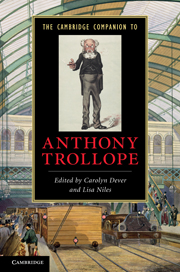Book contents
- Frontmatter
- Introduction
- 1 Trollope’s Literary Life and Times
- 2 Trollope As Autobiographer And Biographer
- 3 Trollope’s Barsetshire Series
- 4 The Palliser Novels
- 5 Trollope Redux: The Later Novels
- 6 Trollope’s Short Fiction
- 7 Trollope And The Sensation Novel
- 8 Queer Trollope
- 9 The hobbledehoy in Trollope
- 10 The construction of masculinities
- 11 Vulgarity and money
- 12 Trollope and the law
- 13 Trollope and travel
- 14 Trollope and the Antipodes
- 15 Trollope and Ireland
- 16 Trollope and America
- Further reading
- Index
- Cambridge Companions to . . .
5 - Trollope Redux: The Later Novels
Published online by Cambridge University Press: 28 March 2011
- Frontmatter
- Introduction
- 1 Trollope’s Literary Life and Times
- 2 Trollope As Autobiographer And Biographer
- 3 Trollope’s Barsetshire Series
- 4 The Palliser Novels
- 5 Trollope Redux: The Later Novels
- 6 Trollope’s Short Fiction
- 7 Trollope And The Sensation Novel
- 8 Queer Trollope
- 9 The hobbledehoy in Trollope
- 10 The construction of masculinities
- 11 Vulgarity and money
- 12 Trollope and the law
- 13 Trollope and travel
- 14 Trollope and the Antipodes
- 15 Trollope and Ireland
- 16 Trollope and America
- Further reading
- Index
- Cambridge Companions to . . .
Summary
Late in 1859, Trollope left Ireland, where he had lived for eighteen years, and settled near London. He had enjoyed Ireland, but “had often sighed to return to England . . . and with some little difficulty got myself appointed to the Eastern [Postal] District of England.” His Irish years had made him almost an outsider to English life, and perhaps explain the nostalgic mood of The Warden and Barchester Towers as their author imagined the placid “dear county” from an Ireland resentful of British rule and, in the late forties, undergoing the agonies of the Great Famine (A ch. 8). Phineas Finn, newly elected to Parliament for an Irish constituency, is “very quick to learn” the customs and rituals of Parliament (PF ch. 9), perhaps recalling Trollope’s own self-conscious re-entry into English life, and his determination to understand how the political and social worlds of London interacted, the subject matter of much of his future work. Marginalized in childhood, and in his Irish exile, he was now uniquely prepared to examine English society with the fascination of an outsider and a new self-confidence as an insider. Approaching his fifth decade, Trollope would become a more inclusive and a more ambitious novelist, in ways that make it critically useful to distinguish earlier and later categories of his fiction.
- Type
- Chapter
- Information
- The Cambridge Companion to Anthony Trollope , pp. 58 - 70Publisher: Cambridge University PressPrint publication year: 2010
- 1
- Cited by

